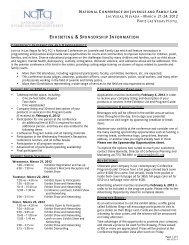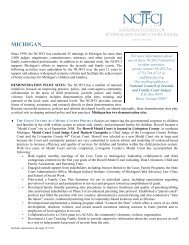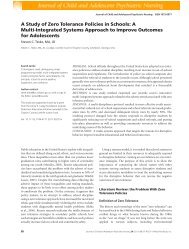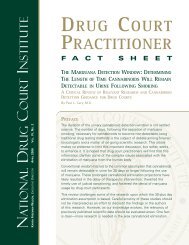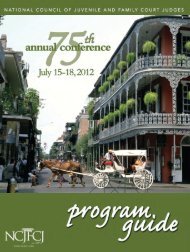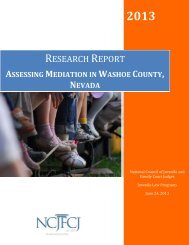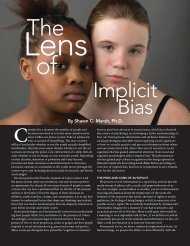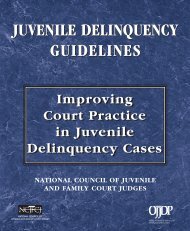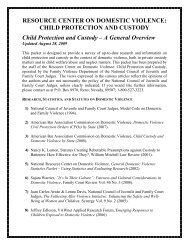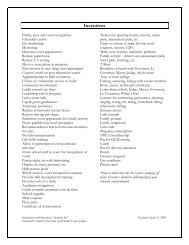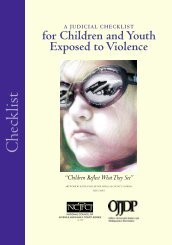dowNload - National Council of Juvenile and Family Court Judges
dowNload - National Council of Juvenile and Family Court Judges
dowNload - National Council of Juvenile and Family Court Judges
You also want an ePaper? Increase the reach of your titles
YUMPU automatically turns print PDFs into web optimized ePapers that Google loves.
INTERNATIONAL OUTREACH<br />
Judge Leonard Edwards (Ret.), Melodee Hanes, <strong>and</strong> Dr. Rodney Erwin train juvenile court judges in Morocco.<br />
Working with <strong>Juvenile</strong> <strong>Court</strong><br />
<strong>Judges</strong> in Morocco<br />
When Dr. Shawn Marsh, NCJFCJ Chief Program Officer, <strong>Juvenile</strong><br />
Law, called <strong>and</strong> asked if I was interested in going to Morocco this past<br />
December to train juvenile court judges, I did not hesitate. One <strong>of</strong> the<br />
advantages <strong>of</strong> being retired is that I have some control over my schedule.<br />
I said yes, despite the fact that the trip was complex <strong>and</strong> only a<br />
month away. My contact in Rabat, Morocco (the capital) was Vasantha<br />
Rao, an American attorney working in the United States Department<br />
<strong>of</strong> Justice (DOJ). From her I learned that I would be joined by<br />
Melodee Hanes, the Acting Director <strong>of</strong> the Office <strong>of</strong> <strong>Juvenile</strong> Justice<br />
<strong>and</strong> Delinquency Prevention (OJJDP), <strong>and</strong> Dr. Rodney Erwin, a<br />
neuro-psychiatrist from Marin County, California.<br />
The training project was organized by the DOJ. Apparently, the<br />
Moroccan judiciary wanted to learn about juvenile justice in the<br />
United States. Moroccan judicial leaders contacted the DOJ <strong>and</strong><br />
arranged for this three-day training in Rabat.<br />
Morocco has strong ties with France, having been under French<br />
control during much <strong>of</strong> the 20th century. The Moroccan legal<br />
system is modeled on the French civil law. Morocco, a North African<br />
kingdom <strong>of</strong> approximately 32,500,000, is a predominantly Muslim<br />
country, with a rich history dating back 5,000 years. Its most famous<br />
cities include Casablanca, Marrakesh, Rabat, <strong>and</strong> Fes. Arabic <strong>and</strong><br />
French are the primary languages, although some speak English.<br />
Moroccans use Arabic script <strong>of</strong>ten sub-titled with French. While the<br />
traditional Islamic family structure means that some women remain<br />
covered (hijab) <strong>and</strong> live a limited public life, many younger women<br />
work outside the home <strong>and</strong> dress in Western clothing. I found the<br />
people friendly <strong>and</strong> gracious. Several judges invited me to stay in their<br />
homes while I was visiting.<br />
My first question about the training revolved around the differences<br />
between the civil law system <strong>and</strong> our common law. Would our<br />
American laws <strong>and</strong> practices be useful to a country with different legal<br />
procedures? The civil law dates back to Roman times. The Roman<br />
24 JUVENILE AND FAMILY JUSTICE TODAY | WINTER 2013<br />
By Judge Leonard Edwards (Ret.)<br />
codes were unified in the sixth century during the reign <strong>of</strong> Justinian,<br />
an Emperor <strong>of</strong> the Eastern Roman Empire. Legal scholars in many<br />
European countries refined the civil law over the centuries that<br />
followed. One <strong>of</strong> most significant codifications was the Napoleonic<br />
Code created when Napoleon ruled France. The Napoleonic Code has<br />
been very influential <strong>and</strong> has helped shape the civil law systems now<br />
in place in approximately 150 countries including most <strong>of</strong> Southern<br />
Europe, Northern Africa, Russia, Japan, <strong>and</strong> South America. The civil<br />
law has also left traces in the United States, namely in Louisiana.<br />
The significant differences between the civil <strong>and</strong> common law<br />
systems include the following:<br />
1. <strong>Judges</strong> in the civil law tradition select their pr<strong>of</strong>ession at the time they<br />
start law school. They are appointed to their position fresh from school.<br />
As a result, a judge will ordinarily begin his or her career earlier in life<br />
than a judge in the common law country.<br />
2. Civil law judges look to the codes <strong>and</strong> legal principles for answers to all<br />
legal questions. They do not look to case law. Cases are rarely reported or<br />
read by judges as they have no authority for a sitting judge. The concept<br />
<strong>of</strong> stare decisis (a lower court being bound to follow the rulings <strong>of</strong> a<br />
higher court) is unknown in the civil law.<br />
3. The judicial branch in civil law countries is not as independent or powerful<br />
as judges in common law countries. The legislative <strong>and</strong> executive<br />
branches <strong>of</strong> civil law countries are the primary policy makers. As a result,<br />
judges have limited power to interpret the law. <strong>Judges</strong> cannot declare<br />
a law to be unconstitutional. <strong>Judges</strong> resemble bureaucrats rather than<br />
members <strong>of</strong> a separate, co-equal branch <strong>of</strong> government. As Pr<strong>of</strong>essor<br />
Merryman writes, “[t]hey are civil servants, functionaries.” 1<br />
4. A juvenile court judge in a civil law country is expected to investigate<br />
the facts <strong>of</strong> cases appearing in court. The judge can gather evidence,<br />
interview witnesses, <strong>and</strong> still preside as decision maker in the case before<br />
the court. These are characteristics <strong>of</strong> an inquisitorial system as opposed<br />
to our adversarial system.




